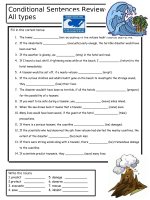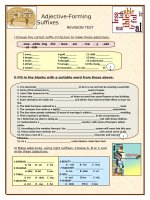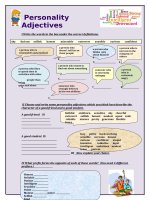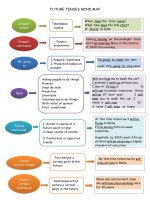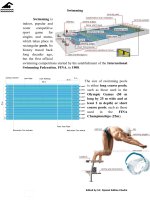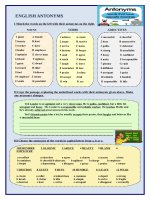islcollective worksheets preintermediate a2 intermediate b1 upperintermediate b2 advanced c1 proficient c2 adults studen 1850819149540078e5db1968 03112669
Bạn đang xem bản rút gọn của tài liệu. Xem và tải ngay bản đầy đủ của tài liệu tại đây (83.93 KB, 3 trang )
TIME RELATED ACTIVE VERB CONSTRUCTIONS
FROM THE PAST TO THE FUTURE
The simple form is used for
facts, truths, verbs of state,
mind related verbs (like, hate,
doubt)
PAST PERFECT SIMPLE
John had already seen the
film so he didn’t come with
us.
Had you ever visited a
museum before you went to
Rome?
We had lived in London for
years before we could afford
to buy a house.
The continuous form is used for
actions in course at a given
moment/period in time
PAST PERFECT CONTINUOUS
Related to a fact
(simple)/the duration of
an action (continuous)
which precedes a point
of time in the past
PAST SIMPLE
I visited London last year.
Did you see John yesterday?
I didn’t buy the green
dress, I bought the red one.
Where were you when it
started raining?
John arrived ten minutes
ago.
PAST CONTINUOUS
Related to a discernible
point of time in the
past.
PRESENT PERFECT SIMPLE
Have you ever been to
London?
I have seen this film three
times.
John hasn’t finished his
homework yet.
I haven’t been to the cinema
this week.
PRESENT SIMPLE
I live in London.
Where does John live?
We don’t know the answer.
John hasn’t got a dog.
Who are you?
Water boils at 100°C.
They usually go to the
cinema once a week.
PRESENT SIMPLE
(FUTURE)
When does school start this
year? It starts in
September.
What time is the meeting?
It’s at 3 p.m.
Does this shop open today?
No, but it is open tomorrow
from 8 a.m. to 5 p.m.
What time does your flight
leave?
It doesn’t leave until 9.00.
There was a hole in John’s
trousers because he had been
fighting.
I had been waiting for the bus
for an hour when it finally
arrived.
How long had they been playing
tennis when it started raining?
I wasn’t watching TV when you
called me.
What were you doing when the
accident occurred?
Mary fell off the ladder while
she was painting the ceiling.
PRESENT PERFECT CONTINUOUS
Related to a fact
(simple)/the duration of
an action (continuous)
which precedes the
present time (before
now)
Simple: something
which is always true,
frequency, habits,
facts
Continuous: Action
now/ at the moment
of speaking. Actions
which disturb us.
Simple: timetable of
things and events.
Continuous: People’s
actions arranged for
the future/programs
1
How long have you been waiting
for me?
My hands are dirty because I
have been repairing my bicycle.
You look tired! Have you been
working hard?
PRESENT CONTINUOUS
What is John doing? – He’s
washing the car.
Be quiet! I’m studying for my
exams.
Excuse me. Is anybody sitting
here?
I don’t like him, he’s always
smoking when I see him.
PRESENT CONTINUOUS
(FUTURE)
What time is John leaving? He
is leaving on the midnight
train.
John is coming to visit us next
week.
What are you doing on Saturday
morning? I’m going to the
park.
I’m sorry! I can’t help you.
I’m playing tennis with John
this afternoon.
FUTURE PERFECT SIMPLE
Come to my office at 8.00
tomorrow. I will have
finished my project by then.
I’m not sure that I will
have read all these books
before the exam.
FUTURE PERFECT CONTINUOUS
A fact/action takes
place before, and is
related to, a future
point in time.
FUTURE SIMPLE – Will
Will you help me(to) open
the window?
I promise I won’t go there.
I like it! I’ll buy it.
It will rain in London
tomorrow
John will be 27 in June.
When you arrive, I’ll meet
you.
I don’t think it will rain.
If it rains I will cancel
the event.
FUTURE CONTINUOUS
Simple: ‘Will’ takes
the verb associated
to it into the future.
Continuous: at a
future point in time
this action will be
ongoing.
IN ADDITION:
Future clauses with simple
present
When I arrive I will phone
you.
As soon as I arrive I’ll
call.
Before I leave I’ll call
you.
If it stops raining we can
go to the shops.
I hope to see John while I
am in London next week.
Future clauses with present
perfect
After I have phoned John, we
can have lunch.
When you have finished with
the newspaper, may I borrow
it?
GOING TO
Future clauses with
‘when, as soon as,
until, till, before,
after, as long as,
providing, while ‘
No specific future
time is mentioned.
Sequence of events
where the first event
is completed before
the second takes
place.
I’m going to watch TV.
John says he is going to
visit Italy sooner or later.
People’s intentions
Look at those clouds! It’s
going to rain.
Predictions based on
the present
ABOUT TO
The Queen is about to
present the soldier with his
medal.
You are about to see
something very unusual.
John is about to go to a
meeting. He hasn’t got time
to talk to you now.
When I retire next June, I will
have been working for this
company for twenty-five years.
When the ceremony finishes
those soldiers will have been
standing to attention for two
hours.
Immediate future
2
Don’t phone me this evening.
I’ll be watching the Cup Final
on TV and I don’t want to be
disturbed.
This time next week I’ll be
lying on a beach in Italy.
John won’t be coming with us
because he is ill.
In a few years’ time a lot of
people will be working from
home.
FUTURE IN THE PAST
I knew John would arrive on
time.
He promised he would send us
some money as soon as he
could.
I knew he wouldn’t keep the
secret.
I thought John was going to
make a mistake.
On Monday I was told they
were going to give me some
money.
Expresses the idea
that at a point of
time in the past
something
would/might happen
in the future
3
